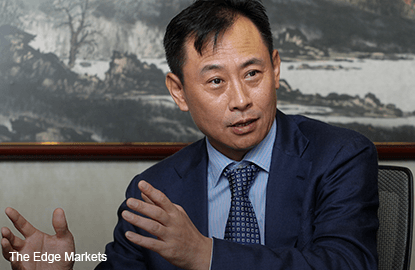
This article first appeared in The Edge Malaysia Weekly, on April 11 - 17, 2016.
Many say China’s decelerating growth, as a result of its government’s mismanagement, has cast a pall over the global economy.
Wang Hongwei, however, disagrees with this notion. “We (China) are not the ones who caused the world economic disaster. But now, we are the ones who are suffering,” says the CEO of Bank of China (M) Bhd (BoC).
According to him, the economic problems faced by the country were brought on by the remedial measures the Chinese government took during the global financial crisis in 2008.
Wang says China had spent RMB4 trillion (equivalent to about RM2.42 trillion) to pump-prime its domestic economy, which then became the locomotive of global growth after the onset of the US subprime loan crisis. The latter wreaked havoc on global financial markets, particularly in the West.
While most countries in the Western world were picking up the pieces, Asia — particularly China — became the sweet spot for economic growth from 2009 until last year, when structural problems began surfacing.
One economic problem faced by China is overcapacity, brought about by the world gradually “closing its door” to the country. Many countries now import less from it.
“So, the slowdown in the global economy today is not because of China’s overcapacity. It is due to the slowdown in global demand,” explains Wang.
Nevertheless, he is confident that the Chinese government will be able to come up with a set of policies to transform the country’s economy. For instance, consumer spending may become its key growth driver.
“The Chinese government is transforming the financial system and resolving the structural problems that have accumulated over the years. While doing that, some companies are being shut down,” says Wang.
China saw gross domestic product growth of 6.9% last year — considerably stronger than many other large economies, but the slowest pace it has seen in the last 25 years. The government has revised this year’s growth target to 6.5% to 7%. BoC is forecasting 6.8% growth.
Mounting bad debts is a growing concern in China. There are fears that souring loans will cripple the financial system of the world’s second largest economy.
To address that, the Chinese government is considering asking banks to adopt a debt/equity swap to restructure the non-performing loans. This has drawn criticism as some believe the move will shift the problems from companies to the banks.
Wang says the government has “creative” ways of dealing with the issues, although Westerners may not agree with the methods. “So, I am not so worried about the impact of this, and although China’s financial system is not perfect, I believe it will improve gradually.”
On the potential impact on the banking group, Wang concedes that a slowing Chinese economy would no doubt put pressure on BoC in its home market. However, as its return on foreign assets is close to 30%, it will help to mitigate the negative impact, he says.
Wang points out that BoC’s foreign assets and earnings contribution crossed over 25% for the first time last year, reaching 27%. This means that its overseas operations are now an important contributor to its business.
Save by subscribing to us for your print and/or digital copy.
P/S: The Edge is also available on Apple's AppStore and Androids' Google Play.